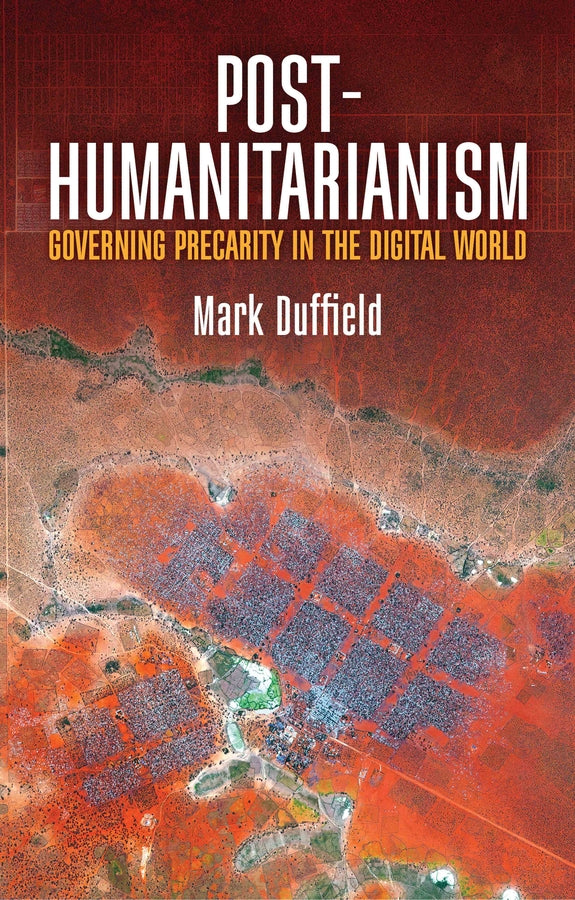Description
Explore the thought-provoking concepts in 'Post-Humanitarianism' by Mark Duffield, a crucial read for those navigating today’s complex global landscape. This **groundbreaking book** examines the intersection of development, security, and governance in an era marked by **political instability** and uncertainty. With its ISBN 9780745698595, the **224-page publication** from **John Wiley & Sons (UK)** invites you to rethink our relationship with technology and connectivity. Duffield argues that while we celebrate advancements in digital tools for **sense-making**, they may also facilitate new forms of control, behavioral incorporation, and cognitive subordination. Rather than simply responding to crises, society increasingly adapts to a state of **permanent emergency**, where humanitarian disasters are leveraged to test social automation and management techniques. This insightful book sheds light on the paradox of resilience amidst **growing societal polarization** and the deterioration of political trust. Essential for students and thoughtful readers alike, 'Post-Humanitarianism' challenges us to reflect on our role and responsibilities in a world shaped by both precariousness and technological transformation.
Note: Shipping for this item is free. Please allow up to 6 weeks for delivery. Once your order is placed, it cannot be cancelled. Condition: BRAND NEW. Year: 2018.
Note: Shipping for this item is free. Please allow up to 6 weeks for delivery. Once your order is placed, it cannot be cancelled.
Condition: BRAND NEW
ISBN: 9780745698595
Year: 2018
Publisher: John Wiley & Sons (UK)
Pages: 224
Description:
The world has entered an unprecedented period of uncertainty and political instability. Faced with the challenge of knowing and acting within such a world, the spread of computers and connectivity, and the arrival of new digital sense-making tools, are widely celebrated as helpful. But is this really the case, or have we lost more than gained in the digital revolution? In Post-Humanitarianism, renowned scholar of development, security and global governance Mark Duffield offers an alternative interpretation. He contends that connectivity embodies new forms of behavioural incorporation, cognitive subordination and automated management that are themselves inseparable from the emergence of precarity as a global phenomenon. Rather than protect against disasters, we are encouraged to accept them as necessary for strengthening resilience. At a time of permanent emergency, humanitarian disasters function as sites for trialling and anticipating the modes of social automation and remote management necessary to govern the precarity that increasingly embraces us all. Post-Humanitarianism critically explores how increasing connectivity is inseparable from growing societal polarization, anger and political push-back. It will be essential reading for students of international and social critique, together with anyone concerned about our deepening alienation from the world.
Note: Shipping for this item is free. Please allow up to 6 weeks for delivery. Once your order is placed, it cannot be cancelled. Condition: BRAND NEW. Year: 2018.
Note: Shipping for this item is free. Please allow up to 6 weeks for delivery. Once your order is placed, it cannot be cancelled.
Condition: BRAND NEW
ISBN: 9780745698595
Year: 2018
Publisher: John Wiley & Sons (UK)
Pages: 224
Description:
The world has entered an unprecedented period of uncertainty and political instability. Faced with the challenge of knowing and acting within such a world, the spread of computers and connectivity, and the arrival of new digital sense-making tools, are widely celebrated as helpful. But is this really the case, or have we lost more than gained in the digital revolution? In Post-Humanitarianism, renowned scholar of development, security and global governance Mark Duffield offers an alternative interpretation. He contends that connectivity embodies new forms of behavioural incorporation, cognitive subordination and automated management that are themselves inseparable from the emergence of precarity as a global phenomenon. Rather than protect against disasters, we are encouraged to accept them as necessary for strengthening resilience. At a time of permanent emergency, humanitarian disasters function as sites for trialling and anticipating the modes of social automation and remote management necessary to govern the precarity that increasingly embraces us all. Post-Humanitarianism critically explores how increasing connectivity is inseparable from growing societal polarization, anger and political push-back. It will be essential reading for students of international and social critique, together with anyone concerned about our deepening alienation from the world.

